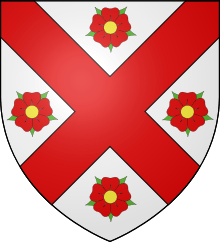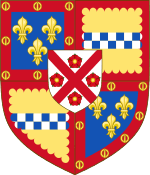Earl of Lennox
| Earldom of Lennox | |
|---|---|
 Argent, a saltire between four roses gules | |
| Creation date | 12th century |
| Peerage | Peerage of Scotland |
| First holder | David of Scotland, Earl of Huntingdon (first known) |
| Former seat(s) | Balloch Castle |
The Earl or Mormaer of Lennox was the ruler of the district of the Lennox in western Scotland.
Ancient earls
The first earl recorded is Ailin I, sometimes called 'Alwin'. He is traditionally said to have been created Earl of Lennox by King Malcolm IV in 1154, but this is likely too early a date. [Note: Other sources say Arkil (Arkyll) was the first mormaer. He fled Northumberland for Scotland about 1070 and was made Mormaer of Levenax by Malcolm. That title was in the 12th century changed to earl of Lennox.] The earldom may in fact have been created in the late twelfth century by King William the Lion for his brother David, and after David gained the higher title Earl of Huntingdon, he resigned the Earldom of Lennox and it passed to Ailin.
Earl Ailin's parentage and background is unknown. His line continued as Earls of Lennox until the time of Earl Duncan in the fifteenth century. Duncan's daughter Isabella married Murdoch, son of Robert, Duke of Albany. Duncan hoped this marriage would improve the family's prospects, but it would in fact be their downfall. Duke Robert had infamously murdered David, the heir to the throne, and when David's brother James became king, he wreaked his vengeance: almost the entire family were executed, including Earl Duncan, despite the fact he had had no part in the murder.
Isabella was imprisoned in Tantallon Castle, but she escaped execution, and succeeded her father as Countess of Lennox. All four of her sons died in her lifetime: two from King James's retribution, and two from natural causes. She had several grandsons, but none of them were legitimate, and the earldom therefore died with her around the year 1457.
Stewart earls

In 1473 the earldom was reclaimed by Sir John Stewart of Darnley, who was the grandson of Elizabeth Lennox, daughter to Earl Duncan and sister to Countess Isabella. In 1565 his great-great-great-grandson Henry, Lord Darnley married Mary, Queen of Scots. He would be murdered at Kirk o' Field in 1567, and therefore on the death of his father Earl Matthew, the earldom of Lennox passed to James, the son of Henry and Mary. James would accede as King of Scots a few months later, and the title consequently merged with the Crown.
In 1572, the earldom was conferred upon King James's uncle Charles. He did not long enjoy the title, for he died four years later at the age of twenty-one. It was next granted to the king's great-uncle Robert in 1578. This Robert, described as being "symple and of lyttle action or accomte", was persuaded to exchange the earldom of Lennox for the earldom of March, so that the king could give the former title to his friend and cousin Esmé. In 1581, Esmé's earldom was raised to a dukedom, and his line continued as Dukes of Lennox until the time of his great-grandson Charles, who died childless in 1672 after drowning at Elsinore while on a diplomatic mission to the Danish government.
In 1675, the Dukedom of Lennox was conferred upon Charles, bastard son of King Charles II, along with the English Dukedom of Richmond and several other titles. However, he would later sell his lands in the Lennox to the Duke of Montrose, meaning he became Duke of Lennox in name alone. This line survives today, and is currently headed by another Charles. Despite being Stewarts, they used "Lennox" as their surname, which was changed to "Gordon-Lennox" in the 19th century after the fourth Duke married Lady Charlotte Gordon, sister and heiress to George, Duke of Gordon.
List of earls and dukes of Lennox
Earls of Lennox (12th century)
- David, Earl of Huntingdon (died 1219) [first known holder]
- Ailin I, Earl of Lennox (d. c. 1200)
- Ailin II, Earl of Lennox (d. 1217)
- Maldouen, Earl of Lennox (d. 1250)
- Malcolm I, Earl of Lennox (d. 1303)
- Malcolm II, Earl of Lennox (d. 1333)
- Donald, Earl of Lennox (d. 1365)
- Margaret, Countess of Lennox (?) (resigned 1385)
- m. Walter of Faslane, descendant of the second Earl.
- Duncan, Earl of Lennox (d. 1425)
- Isabella, Countess of Lennox (d. 1458)
The title became extinct c. 1459, as all four sons of Countess Isabella died without legitimate issue.
Earls of Lennox, 'second creation' (1488)
- John Stewart, Earl of Lennox (d. 1495)
- Matthew Stewart, Earl of Lennox (1488–1513, at the Battle of Flodden)
- John Stewart, Earl of Lennox (d. 1526)
- Matthew Stewart, Earl of Lennox (1516–1571)
- Henry Stewart, Lord Darnley (1545–1567), heir to the earldom but predeceased his father; husband to Mary, Queen of Scots and father of James VI, King of Scots
The title merged with the Crown upon the death of the fourth Earl.
Earls of Lennox, third creation (c. 1571)
- Charles Stewart, Earl of Lennox (1555–1576), second son of the fourth Earl of the second creation.
Earls of Lennox, fourth creation (1578)
- Robert Stewart, Earl of Lennox, "exchanged" for the Earldom of March in 1580, second son of the third Earl of the second creation.
Earls of Lennox, fifth creation (1580)
- Esmé Stewart, Earl of Lennox (1542–1583), grandson of the third Earl of the second creation through his third son John.
Dukes of Lennox, first creation (1581)
- Esmé Stewart, Duke of Lennox (1542–1583)
- Ludovic Stewart, Duke of Lennox and Richmond (1574–1623)
- Esmé Stewart, Duke of Lennox (1579–1624)
- James Stewart, Duke of Lennox and Richmond (1612–1655)
- Esmé Stewart, Duke of Lennox and Richmond (1649–1660)
- Charles Stewart, Duke of Lennox and Richmond (1639–1672) (extinct)
Dukes of Lennox, second creation (1675)
- Charles Lennox, Duke of Lennox and Richmond (1672–1723)
- Charles Lennox, Duke of Lennox and Richmond (1701–1750)
- Charles Lennox, Duke of Lennox and Richmond (1736–1806)
- Charles Lennox, Duke of Lennox and Richmond (1764–1819)
- Charles Gordon-Lennox, Duke of Lennox and Richmond (1791–1860)
- Charles Gordon-Lennox, Duke of Lennox, Richmond and Gordon (1818–1903)
- Charles Gordon-Lennox, Duke of Lennox, Richmond and Gordon (1845–1928)
- Charles Gordon-Lennox, Duke of Lennox, Richmond and Gordon (1870–1935)
- Frederick Gordon-Lennox, Duke of Lennox, Richmond and Gordon (1904–1989)
- Charles Gordon-Lennox, Duke of Lennox, Richmond and Gordon (1929–2017)
- Charles Gordon-Lennox, Duke of Lennox, Richmond and Gordon (b. 1955)
Family tree
See also
References
- Anderson, John, "The Celtic Earls of Lennox" in Sir James Paul (ed.) The Scots Peerage Vol. 5, (Edinburgh, 1909), pp. 324-343
- Steuart, A., "Stewart, Duke of Lennox" in Sir James Paul (ed.) The Scots Peerage Vol. 5, (Edinburgh, 1909), pp. 344-362
- Grant, Francis, "Lennox, Duke of Lennox" in Sir James Paul (ed.) The Scots Peerage Vol. 5, (Edinburgh, 1909), pp. 363-371
- Brown, Michael, "Earldom and Kindred: The Lennox and Its Earls, 1200–1458" in Steve Boardman and Alasdair Ross (eds.) The Exercise of Power in Medieval Scotland, c.1200–1500, (Dublin/Portland, 2003), pp. 201–224
- Neville, Cynthia J., Native Lordship in Medieval Scotland: The Earldoms of Strathearn and Lennox, c. 1140–1365, (Portland & Dublin, 2005)
Further reading
